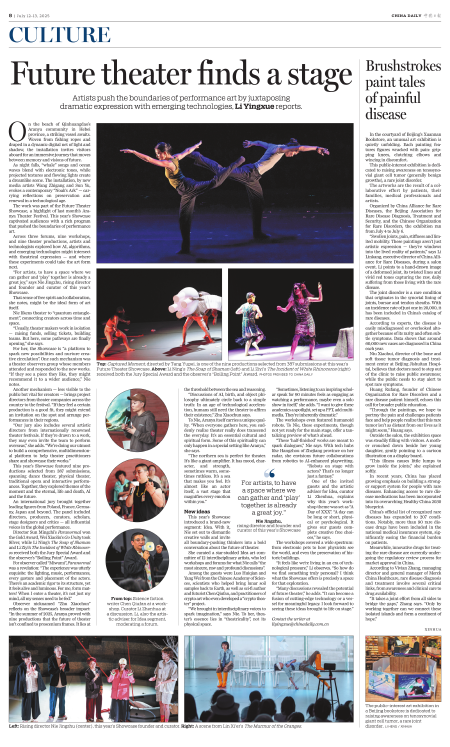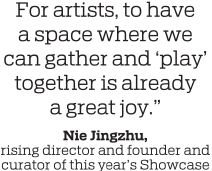
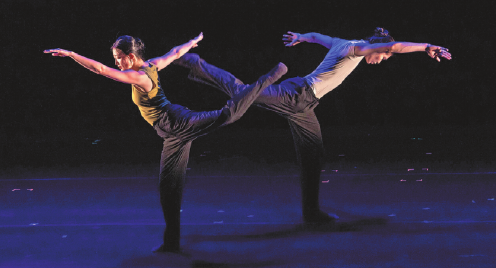
Captured Moment, directed by Tang Yupei, is one of the nine productions selected from 387 submissions at this year's Future Theater Showcase.
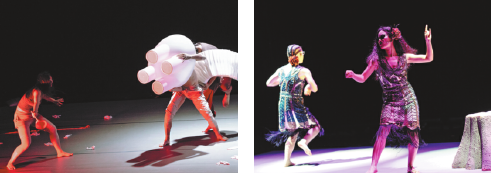
Li Ning's The Soap of Shaman (left) and Li Ziyi's The Incident of White Rhinoceros (right) received both the Jury Special Award and the observer's "Boiling Point" Award.

From top: Science fiction writer Chen Qiufan at a workshop. Curator Li Zhenhua at a discussion. Li, also the artistic adviser for Idea segment, moderating a forum.
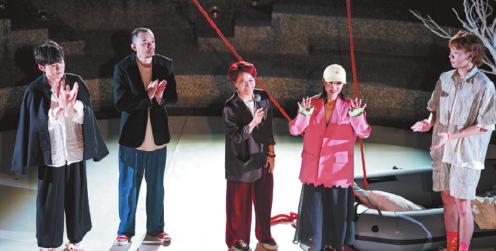
Rising director Nie Jingzhu (center), this year's Showcase founder and curator.
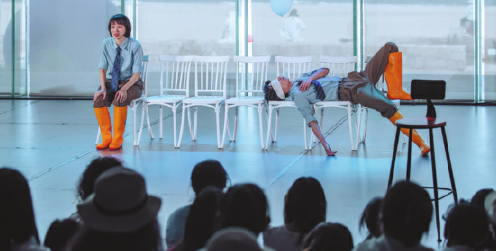
A scene from Lin Xi'er's The Murmur of the Oranges.
On the beach of Qinhuangdao's Aranya community in Hebei province, a striking vessel awaits. Woven from fishing ropes and draped in a dynamic digital net of light and shadow, the installation invites visitors aboard for an immersive journey that moves between memory and visions of future.
As night falls, "whale" songs and ocean waves blend with electronic tones, while projected textures and flowing lights create a dreamlike scene. The installation, by new media artists Wang Zhigang and Sun Yu, evokes a contemporary "Noah's Ark" — carrying reflections on preservation and renewal in a technological age.
The work was part of the Future Theater Showcase, a highlight of last month's Aranya Theater Festival. This year's Showcase captivated audiences with a rich program that pushed the boundaries of performance art.
Across three forums, nine workshops, and nine theater productions, artists and technologists explored how AI, algorithms, and emerging technologies might intersect with theatrical expression — and where these experiments could take the art form next.
"For artists, to have a space where we can gather and 'play' together is already a great joy," says Nie Jingzhu, rising director and founder and curator of this year's Showcase.
That sense of free spirit and collaboration, she notes, might be the ideal form of art itself.
Nie likens theater to "quantum entanglement", connecting creators across time and space.
"Usually, theater makers work in isolation — raising funds, selling tickets, building teams. But here, some pathways are finally opening," she says.
For her, the Showcase is "a platform to spark new possibilities and nurture creative circulation". One such mechanism was a theater observers group whose members attended and responded to the new works. "If they see a piece they like, they might recommend it to a wider audience," Nie notes.
Another mechanism — less visible to the public but vital for creators — brings project directors from theater companies across the country to the festival. "If they feel a certain production is a good fit, they might extend an invitation on the spot and arrange performances in their regions.
"Our jury also includes several artistic directors from internationally renowned theater festivals. If they're drawn to a work, they may even invite the team to perform overseas," she adds. "We're doing our utmost to build a comprehensive, multidimensional platform to help theater practitioners share and showcase their works."
This year's Showcase featured nine productions selected from 387 submissions, spanning dance theater, physical theater, traditional opera and interactive performances. Together, they explored themes of the moment and the eternal, life and death, AI and the future.
An international jury brought together leading figures from Poland, France, Germany, Japan and beyond. The panel included directors, producers, curators, scholars, stage designers and critics — all influential voices in the global performance.
Director Sun Mingchi's Paranormal won the Gold Award, Wei Xiaoliu's Go Unity took Silver, while Li Ning's The Soap of Shaman and Li Ziyi's The Incident of White Rhinoceros received both the Jury Special Award and the observer's "Boiling Point" Award.
For observer called "Miwumi", Paranormal was a revelation: "The experience was utterly exquisite: the lighting, music, performances, every gesture and placement of the actors. There's an academic rigor to its structure, yet it feels alive and luminous. For me, form matters! When I enter a theater, it's not just my mind, all my senses need to be fed."
Observer nicknamed "Zhu Xiaochun" reflects on the Showcase's broader impact: "In the summer of 2025, Aranya proved with nine productions that the future of theater isn't confined to proscenium frames. It lies at the threshold between the sea and reasoning.
"Discussions of AI, birth, and object philosophy ultimately circle back to a simple truth: In an age of technological acceleration, humans still need the theater to affirm their existence," Zhu Xiaochun says.
To Nie, Aranya itself carries a unique quality. "When everyone gathers here, you suddenly realize theater really does transcend the everyday. It's an essential cultural and spiritual form. Some of this spirituality can only happen in a special setting like Aranya," she says.
"The northern sea is perfect for theater. It's like a giant amplifier. It has mood, character, and strength, sometimes warm, sometimes ruthless. It's a sea that makes you feel. It's almost like an actor itself, a vast stage that magnifies every emotion within you."
New ideas
This year's Showcase introduced a brand-new segment: Idea. With it, Nie set out to dismantle creative walls and invite all boundary-pushing thinkers into a bold conversation about the future of theater.
She curated a star-studded Idea art committee of 12 interdisciplinary artists, who led workshops and forums for what Nie calls "the most sincere, raw and profound discussions".
Among the guests were Luo Huiqian and Yang Wei from the Chinese Academy of Sciences, scientists who helped bring lunar soil samples back to Earth, as well as sci-fi author and futurist Chen Qiufan, and practitioners of crypto art who even developed a "crypto theater" project.
"We brought in interdisciplinary voices to spark imagination," says Nie. To her, theater's essence lies in "theatricality", not its physical space.
"Sometimes, listening to an inspiring scholar speak for 90 minutes feels as engaging as watching a performance, maybe even a solo show in itself," she adds. "I want to give these academics a spotlight, set up a PPT, add multimedia. They're inherently dramatic."
The workshops even featured humanoid robots. To Nie, these experiments, though not yet ready for the main stage, offer a tantalizing preview of what's ahead.
"These 'half-finished' works are meant to spark dialogues," Nie says. With tech hubs like Hangzhou of Zhejiang province on her radar, she envisions future collaborations from robotics to AI-enhanced playwriting. "Robots on stage with actors? That's no longer just a fantasy."
One of the invited guests and the artistic adviser for Idea, curator Li Zhenhua, explains why this year's workshop theme was set as "A Day of XXX". "A day can be long or short, physical or psychological. It gives our guests complete creative free choices," he says.
The workshops covered a wide spectrum: from electronic pets to how physicists see the world, and even the preservation of historic buildings.
"It feels like we're living in an era of technological pressure," Li observes. "So how do we find something truly personal? I think what the Showcase offers is precisely a space for that exploration.
"Many discussions revealed the potential of future theater," he adds. "It can become a fusion of cutting-edge technology or a vessel for meaningful legacy. I look forward to seeing these ideas brought to life on stage."
Contact the writer at liyingxue@chinadaily.com.cn
